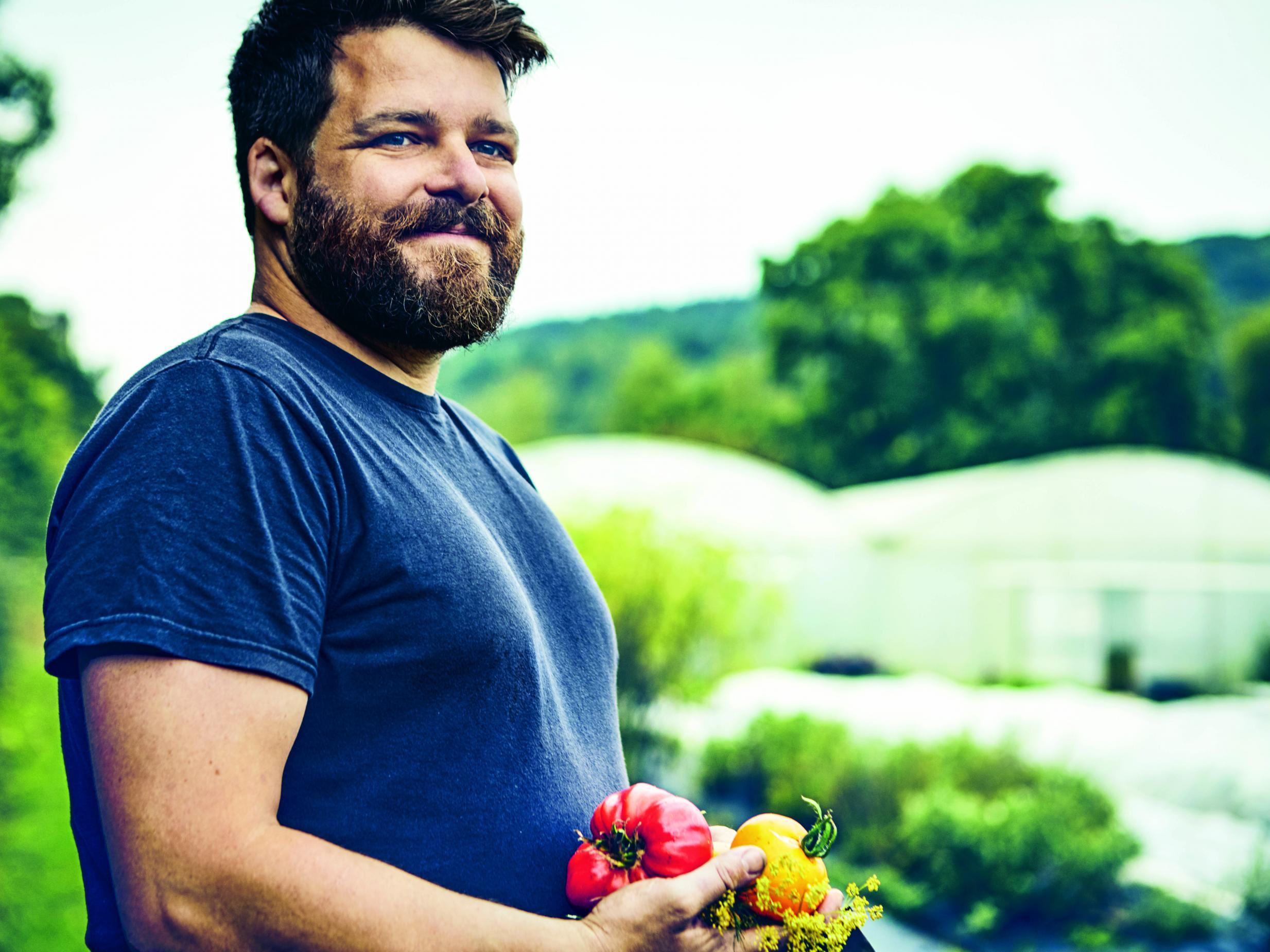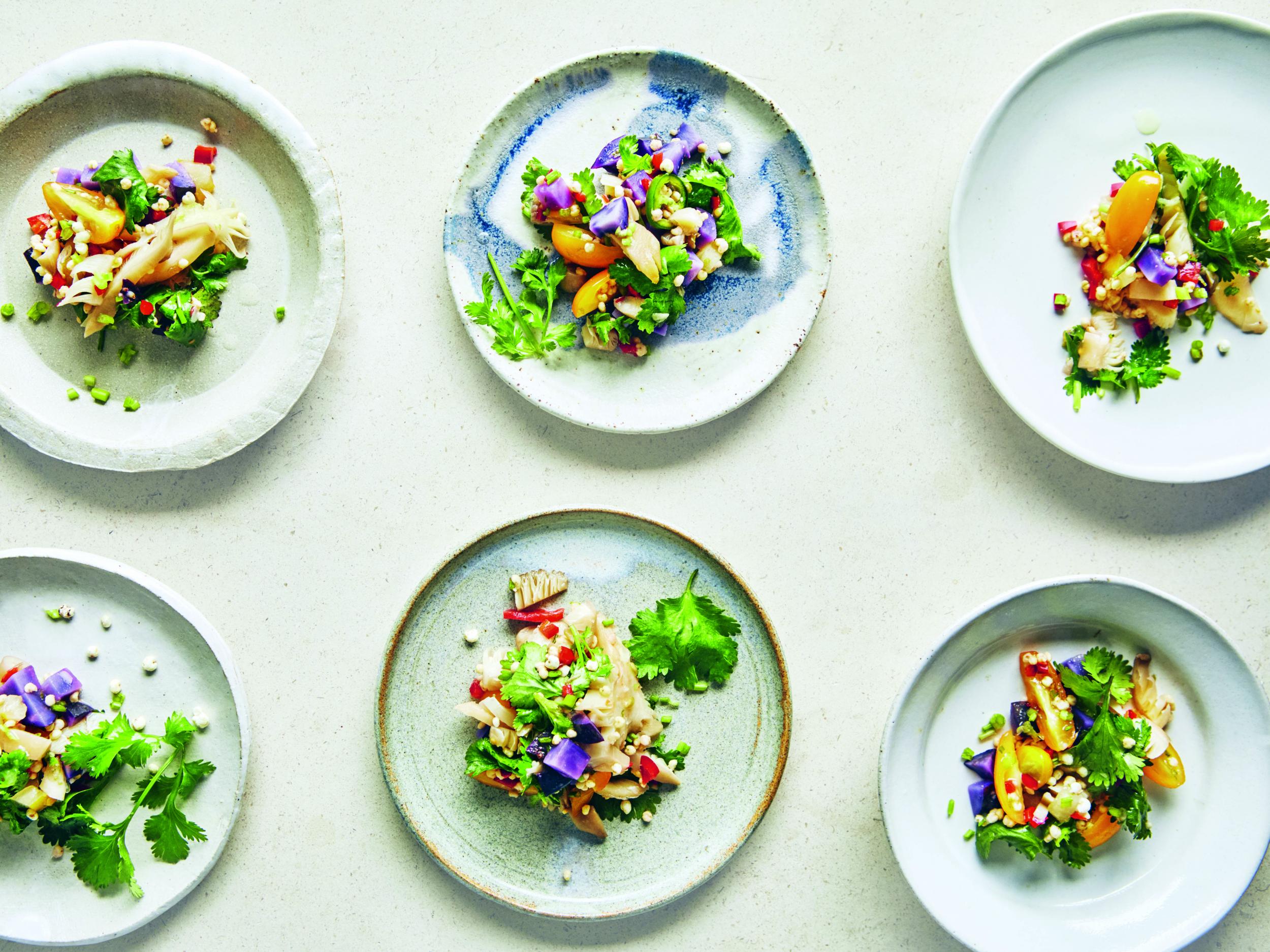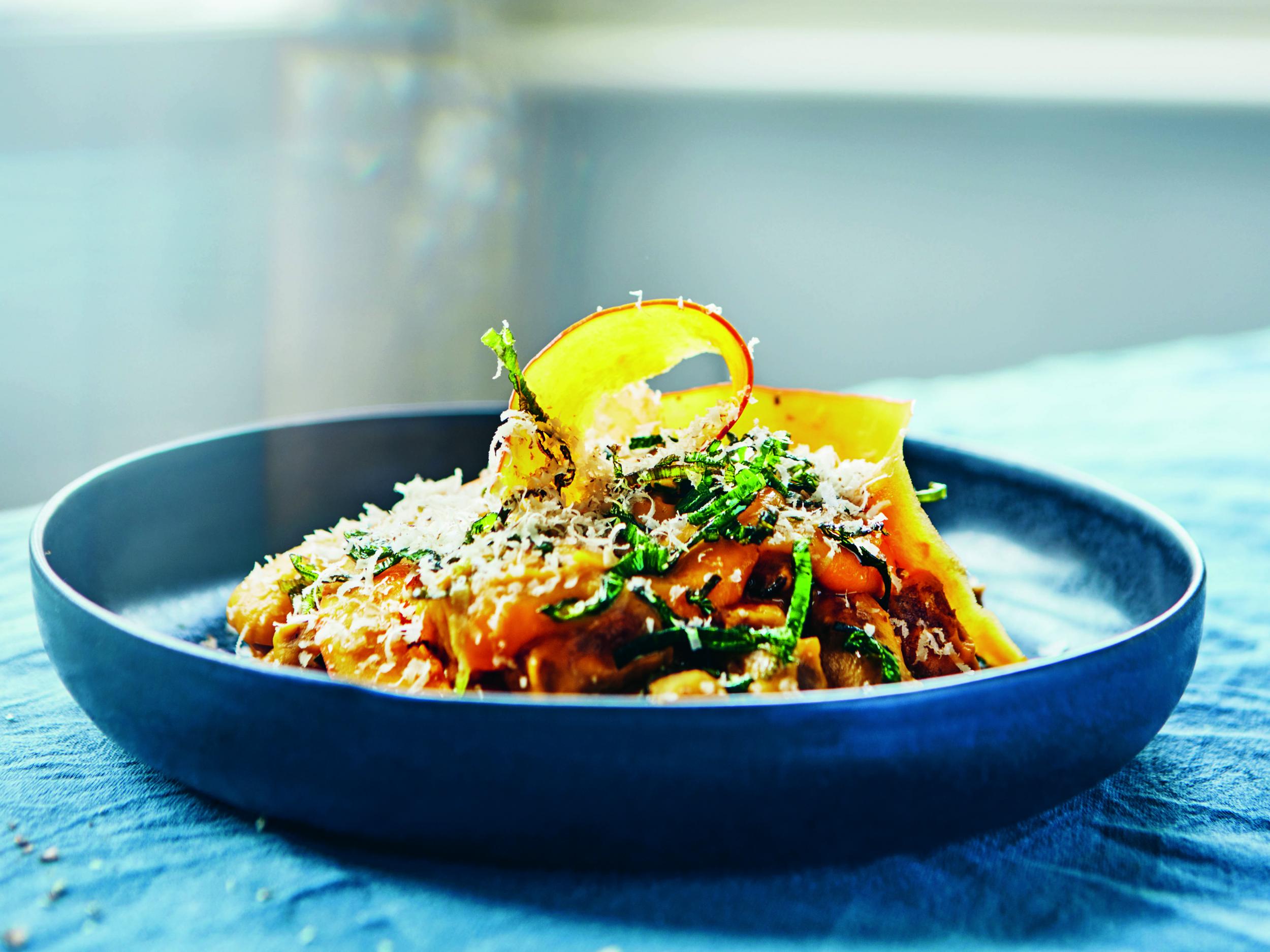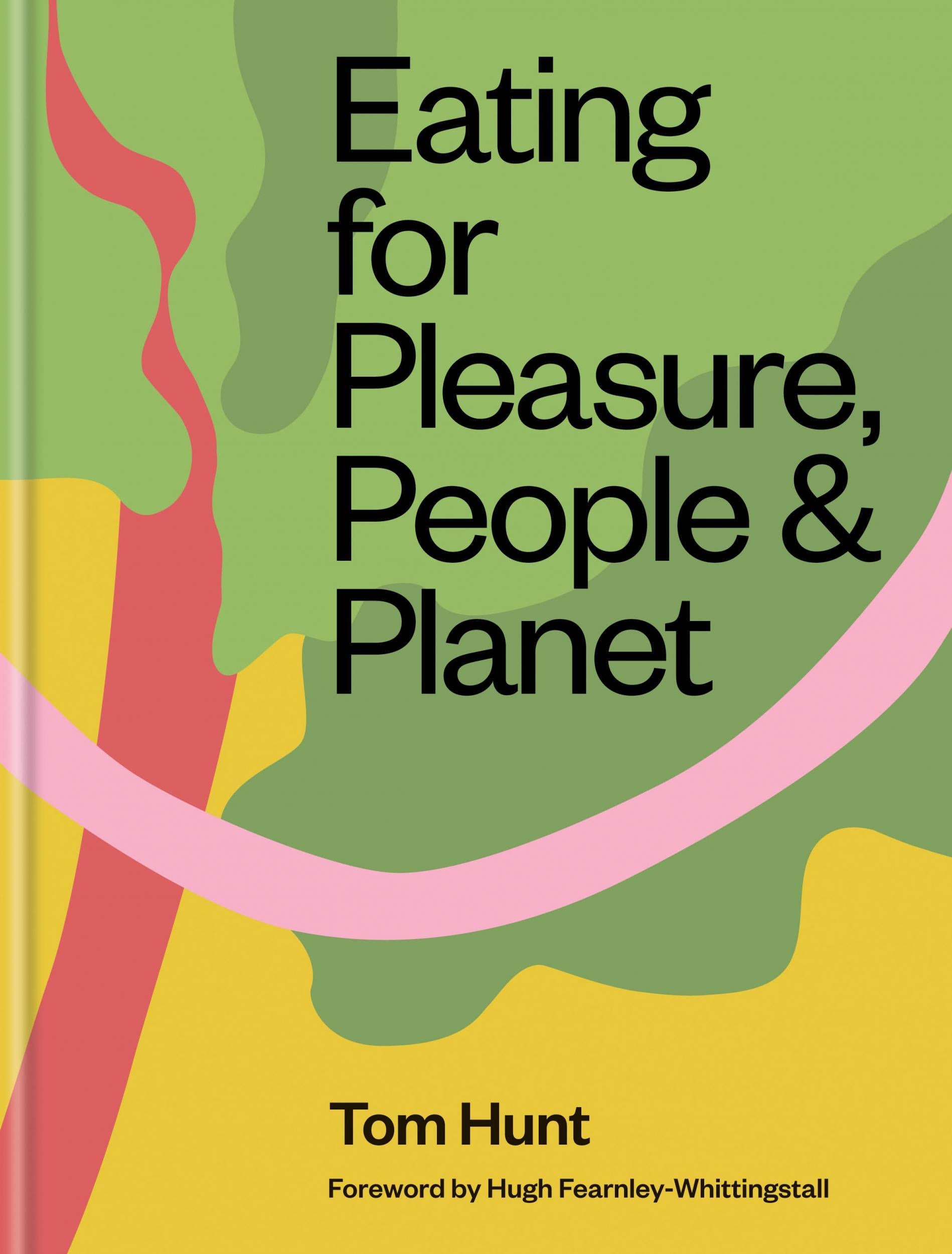‘Any dish can be sustainable’: Tom Hunt talks about his philosophy on eco-friendly cuisine
Following on from nose-to-tail eating, food writer and campaigner Tom Hunt tells Emma Henderson about his root-to-shoot way of cooking, government bias for big businesses and the impact Nestle has by using fewer Fairtrade ingredients


What’s your earliest food memory and who taught you to cook?
Making pancakes with my grandma. Every Shrove Tuesday we’d go to hers to cook together. I remember trying to double flip the pancakes, trying to stick them to the ceiling.
Each chef I’ve worked with over the years has taught me how to cook.
Most recently, Rene Redzepi at Noma, where I did a stage about a year ago. There I learnt about foraged ingredients, fermentation and presentation.
Your new cookbook, ‘Eating for Pleasure, People & Planet’, describes the recipes as ‘climate-friendly cuisine’ – how do you ensure your recipes are climate friendly?
Good question. I’ve developed a food sustainability philosophy called root-to-fruit eating, which the book outlines in detail.
Any ingredient, recipe or dish can be sustainable.
The most important thing to consider is how your ingredients were farmed and by whom.
Which one ingredient could you not live without?
Extra virgin olive oil is my go-to oil and goes on everything. Apart from tasting wonderful, it is a good choice for both the body and the planet.
It can transform the most basic dish and supplements our diets with monounsaturated fat and omega-9 fatty acids, which help reduce cholesterol when used instead of saturated and trans fats – proven by various studies of the Mediterranean diet.
How did your time working at River Cottage influence you?
River Cottage and Hugh Fearnley-Whittingstall have both been a huge influence on my career. He inspired me to write. And showed me how important it is to stick by your morals when it comes to food and business. While I was working there, I learnt to teach and do cookery demonstrations too. I remember the first one – I was so nervous. I made a pate on the pig in a day course.
What do you cook when people come over?
Lately, I’ve been doing DIY vegan sushi with brown rice, tofu and seasonal vegetables. It’s easy to prepare and really fun to make together.

Is there something you think the British food industry is lacking in?
I think not enough support is given to our small farmers. Around 95 per cent of our fruit and 50 per cent or more of our vegetables are imported. The government has a bias for big businesses and doesn’t see the value in building local economies.
How do you think coronavirus will change the restaurant and food world?
In so many ways. Our small restaurant Poco is still unable to open while distancing restrictions are in place at all. We now have a streamlined menu to serve as restaurant-quality takeaway. I think we’ll keep a more streamlined menu from here on in to help us react quickly to any future impacts.

On one hand, there has been a positive shift towards more local food systems by the general public, who are shopping from local shops and subscribing to veg box schemes. However, on the other hand, with all the closures and difficult economic situation, a huge proportion of business has shifted to big food corporations.
Who in the food world do you look to for inspiration?
Vandana Shiva is one of my heroes. She’s an Indian campaigner for seed sovereignty. The right for farmers to harvest and grow their own seeds for the future.
Shocking as it might sound, far too often this is not possible, due to patenting and government legislation.
Other heroes of mine are Carolyn Steel, author of Hungry City and Sitopia. Arthur Potts Dawson, who is now executive chef at Omved Gardens and chef advocate for the World Food Programme.
And Marianna Leivaditaki, head chef at Morito in Hackney and new author of her debut cookbook Aegean: Recipes from the Mountains to the Sea.
How important do you think the slow-food movement is in the UK and do you think it’s spreading through the rest of the food industry?
I’ve learnt so much from following Slow Food (the organisation that promotes local food and traditional cooking). I highly recommend a trip to Terra Madre, their conference in Turin, Italy where hundreds of people come together from all over the world to discuss food. I wish we could bring more of these values to the UK industry.
Do you think a vegan diet is the healthiest way to eat?
I’m interested in the longevity diets of the five blue zones around the world, where the most centenarians live – the Italian island of Sardinia, Okinawa in Japan, Icaria in Greece, Loma Linda in California and the Nicoya Peninsula in Costa Rica. There are many factors that contribute towards a healthy diet, and a focus on plants is certainly one of them.
How important do you think Fairtrade is to the food industry?
Fairtrade is key to sustainable diets and has a few pages dedicated to it in my book.
It is so sad to see Nestle and other corporations buying fewer Fairtrade foods in favour of their own initiatives. The impact of this is catastrophic for small farmers around the world who will lose out on £1.37m in Fairtrade Premium each year. The Fairtrade Premium is essential to farmers at all times, but even more so now as producers face the pandemic and its economic consequences. Some of these farmers have spent up to 40 per cent of their Premium to raise awareness of Covid-19 and to provide protective and health equipment to their communities.
Joanna Pollard, the chair of Fairtrade Yorkshire (York is where the Kit Kat factory is located) has started a petition to the CEO of Nestle on Change.org.
What do you think is one of the most wasted types of food, and what are your tips to avoid wasting it?

Root greens are certainly one of the most wasted foods and are actually so delicious. Beet leaves are more nutritious than the root. As written in my book: “Carrot tops contain six times the vitamin C of the root and are a great source of potassium and calcium. They also contain vitamin K, which is absent from the carrot itself and vital for bone health.”
Utilising root greens saves money and boosts nutrition. In Eating for Pleasure, People & Planet I have recipes for carrot and fennel top pesto, beetroot leaf borani and many other recipes for commonly wasted ingredients such as aquafaba, celery leaves, bread, etc.
Tom Hunt is the author of ‘Eating for Pleasure, People & Planet’
Join our commenting forum
Join thought-provoking conversations, follow other Independent readers and see their replies
Comments